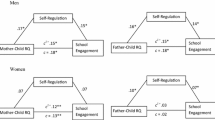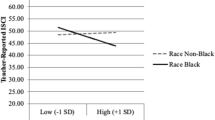Abstract
Self-concept is one important yet understudied construct, often associated with healthy children’s well-being, and particularly crucial for those raised in rural disadvantaged communities. Also, commonly acknowledged is that adults, including parents and teachers, play an important role in fostering self-concept. The overall aim of the current study was to explore self-concept differences between rural and urban children in the state of Victoria, Australia, and to investigate relationships between student–teacher relationships, parental school engagement and self-concept in both groups. The sample comprised 219 triads of children (aged between 7–14 years), parents and teachers, representing rural (n = 33) and urban (n = 186) areas. Children, parents, and teachers completed measures related to self-concept, parental engagement with school, and quality of student–teacher interactions, respectively. No significant differences were detected between the self-concept levels of rural and urban children. However, associations between the student–teacher relationship, parental engagement, and self-concept differed between demographic groups. The unique selfconcept experiences of children from rural and urban areas in Australia have important intervention and research implications. The role of the student–teacher relationship in the development of self-concept in children from rural locations should be considered in addition to parenting and home factors typically associated with fostering selfconcept.
Similar content being viewed by others
References
Beard, J. R., Tomaska, N., Earnest, A., Summerhayes, R., & Morgan, G. (2009). Influence of socioeconomic and cultural factors on rural health. Australian Journal of Rural Health, 17, 10–15.
Beck, J. S., Beck, A. T., Jolly, J. B., & Steer, R. A. (2005). Beck Youth Inventories—Second edition for children and adolescents manual. San Antonio, TX: PsychCorp.
Bourke, L., Humphreys, J. S., Wakerman, J., & Taylor, J. (2012). Understanding rural and remote health: A framework for analysis in Australia. Health & Place, 18(3), 496–503.
Condly, S. J. (2006). Resilience in children: A review of literature with implications for education. Urban Education, 41, 211–236. doi:10.1177/0042085906287902.
Crocker, J., & Major, B. (1989). Social stigma and self-esteem: The self-protective properties of stigma. Psychological Review, 96(4), 608–630.
Davis, S., & Bartlett, H. (2008). Healthy ageing in rural Australia: Issues and Challenges. Australian Journal on Ageing, 27(2), 56–60.
Demaray, M. K., Malecki, C. K., Rueger, S. Y., Brown, S. E., & Summers, K. H. (2009). The role of youth’s ratings of the importance of socially supportive behaviors in the relationship between social support and self-concept. Journal of Youth & Adolescence, 38, 13–28. doi:10.1007/s10964-007-9258-3.
Desimone, L. (1999). Linking parent involvement with student achievement: Do race and income matter? Journal of Educational Research, 93(1), 11–30.
Diehl, M., & Hay, E. L. (2010). Risk and resilience factors in coping with daily stress in adulthood: The role of age, self-concept incoherence, and personal control. Developmental Psychology, 46(5), 1132–1146.
Doumen, S., Buyse, E., Colpin, H., & Verschueren, K. (2011). Teacher-child conflict and aggressive behaviour in first grade: The intervening role of children’s self-esteem. Infant & Child Development, 20, 449–265. doi:10.1002/icd.725.
Edwards, A., & Warin, J. (1999). Parental involvement in raising the achievement of primary school pupils: Why bother? Oxford Review of Education, 25(3), 325–341.
Edwards, B., & Baxter, J. (2013). The tyrannies of distance and disadvantage. Melbourne: Australian Institue of Family Studies.
El Nokali, N. E., Bachman, H. J., & Votruba-Drazl, E. (2010). Parent involvement and children’s academic and social development in elementary school. Child Development, 81(3), 988–1005.
Fan, X., & Chen, M. (2001). Parental involvement and students’ academic achievement: A meta-analysis. Educational Psychology Review, 13(1), 1–22.
Fantuzzo, J. W., Davis, G. Y., & Ginsburg, M. D. (1995). Effects of parent involvement in isolation or in combination with peer tutoring on student self-concept and mathematics achievement. Journal of Educational Psychology, 87(2), 272–281.
Garmezy, N. (1991). Resilience and vulnerability to adverse developmental outcomes associated with poverty. American Behavioral Scientist, 34, 416–430.
Gribble, P. A., Cowen, E. L., Wyman, P. A., Work, W. C., Wannon, M., & Raoof, A. (1993). Parent and child views of parent-child relationship qualities and resilient outcomes among urban children. Journal of Child Psychology and Psychiatry, 34(4), 507–519.
Gutman, L. M. (2008). Risk and resilience. In L. M. Gutman & R. Akerman (Eds.), Research Report. London: Centre for Research on the Wider Benefits of Learning, Institute of Education.
Harter, S. (1999). Symbolic interactionism revised: Potential liabilities for the self constructed in the crucible of interpersonal relationships. Merrill-Palmer Quarterly, 45(4), 677–703.
Jerome, E. M., Hamre, B., & Pianta, R. C. (2009). Teacher-child relationships from kindergarten to sixth grade: Early childhood predictors of teacher-perceived conflict and closeness. Social Development, 18, 916–945. doi:10.1111/j.1467-9507.2008.00508.x.
Jordan, A., & Stanovich, P. (2001). Patterns of teacher-student interaction in inclusive elementary classrooms and correlates with student self-concept. International Journal of Disability, Development & Education, 48(1), 33–52.
LaRocque, M., Kleiman, I., & Darling, S. M. (2011). Parental involvement: The missing link in school achievement. Preventing School Failure: Alternative Education for Children and Youth, 55(3), 115–122.
Leflot, G., Onghena, P., & Colpin, H. (2010). Teacher-child interactions: Relations with children’s self-concept in second grade. Infant & Child Development, 19, 385–405. doi:10.1002/icd.672.
Luthar, S. S., Sawyer, J. A., & Brown, P. J. (2006). Conceptual issues in studies of resilience: Past, present, and future research. Annals of the New York Academy of Sciences, 1094, 105–115. doi:10.1196/annals.1376.009.
Marsh, H. W. (1990). A multidimensional, hierarchical model of self-concept: Theoretical and empirical justification. Educational Psychology Review, 2(2), 77–172.
Masten, A. S., Best, K. M., & Garmezy, N. (1990). Resilience and development: Contributions from the study of children who overcome adversity. Development and Psychopathology, 2, 425–444.
Masten, A. S., Monn, A. R., & Supkoff, L. M. (2011). Resilience in children and adolescents. In S. M. Southwick, B. T. Litz, D. Charney, & M. J. Friedman (Eds.), Resilience and mental health: Challenges across the lifespan. Cambridge: Cambridge University Press.
Metzger, J. (2008). Resilience in children and youth in kinship care and famiily foster care. Child Welfare, 87(6), 115–140.
O’Mara, A., Marsh, H. W., Craven, R. G., & Debus, R. L. (2006). Do self-concept interventions make a difference? A synergistic blend of construct validation and meta-analysis. Educational Psychologist, 41, 181–206. doi:10.1207/s15326985ep4103_4.
Oyserman, D., Brickman, D., & Rhodes, M. (2007). School success, possible selves, and parent school involvement. Family Relations, 56, 479–489.
Pianta, R. C., & Stuhlman, M. W. (2004). Teacher-child relationships and children’s success in the first years of school. School Psychology Review, 33, 444–458.
Pope, J. (2011). Change and disadvantage in regional Victoria: an overview. Melbourne: Department of Planning and Community Development.
Prevatt, F. F. (2003). The contribution of parenting practices in a risk and resiliency model of children’s adjustment. British Journal of Developmental Psychology, 21, 469–480.
Resnick, M. D., Harris, L. J., & Blum, R. W. (1993). The impact of caring and connectedness on adolescent health and well-being. Journal of Pediatrics & Child Health, 29(S1), S3–S9.
Rey, R., Smith, A., Yoon, J., Somers, C., & Barnett, D. (2007). Relationship between teachers and urban African American children: The role of informant. School Psychology International, 28, 346–364.
Reyes, C. J. (2008). Exploring the relations among the nature of the abuse, perceived parental support, and child’s self-concept and trauma symptoms among sexually abused children. Journal of Child Sexual Abuse, 17(1), 51–70.
Smith, K. B., Humphreys, J. S., & Wilson, M. G. A. (2008). Addressing the health disadvantage of rural populations: How does epidemiological evidence inform rural health policies and research? Australian Journal of Rural Health, 16(2), 55–66.
Soares, A. T., & Soares, L. M. (1969). Self-perceptions of culturally disadvantaged children. American Educational Research Journal, 6, 31–45. doi:10.3102/00028312006001031.
Steer, R. A., Kumar, G., Beck, A. T., & Beck, J. S. (2005). Dimensionality of the Beck Youth Inventories with child psychiatric outpatients. Journal of Psychopathology and Behavioral Assessment, 27(2), 123–131.
Steinberg, L., & Monahan, K. C. (2007). Age differences in resistance to peer influence. Developmental Psychology, 43(6), 1531–1543.
Ungar, M. (2004). The importance of parents and other caregivers to the resilience of high-risk adolescents. Family Process, 43, 23–41.
Ungar, M. (2011). The social ecology of resilience: Addressing contextual and cultural ambiguity of a nascent construct. American Journal of Orthopsychiatry, 81(1), 1–17.
VanTassel-Baska, J., Olszewski-Kubilius, P., & Kulieke, M. (1994). A study of self-concept and social support in advantaged and disadvantaged seventh and eight grade gifted students. Roeper Review, 16(3), 186–191.
Waanders, C., Mendez, J. L., & Downer, J. T. (2007). Parent characteristics, economic stress and neighbourhood context as predictors of parent involvement in preschool children’s education. Journal of School Psychology, 45, 619–636. doi:10.1016/j.jsp.2007.07.003.
Werner, E. E. (1995). Resilience in development. Current Directions in Psychological Science, 4(3), 81–84.
Yaeger, D. S., & Dweck, C. S. (2012). Mindsets that promote resilience: When students believe that personal characteristics can be developed. Educational Psychologist, 47(4), 302–314.
Author information
Authors and Affiliations
Corresponding author
Rights and permissions
About this article
Cite this article
Gavidia-Payne, S., Denny, B., Davis, K. et al. Children’s self-concept: parental school engagement and student–teacher relationships in rural and urban Australia. Soc Psychol Educ 18, 121–136 (2015). https://doi.org/10.1007/s11218-014-9277-3
Received:
Accepted:
Published:
Issue Date:
DOI: https://doi.org/10.1007/s11218-014-9277-3




